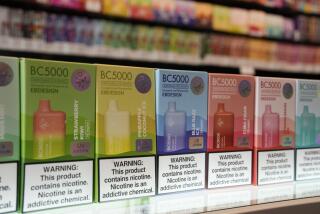Drug Program Curbs Cocaine Use, Study Says
- Share via
WASHINGTON — A five-year government study has shown for the first time that a comprehensive anti-drug program can significantly reduce cocaine use among teen-agers, researchers announced Friday.
A preliminary analysis of eight schools in the study found that 1.6% of the program students used cocaine in the last month, contrasted with 3.7% of those not in the program.
If the same percentage difference on cocaine use were applied nationally, it would mean 500,000 fewer teen-agers were using cocaine, said Charles Schuster, director of the National Institute on Drug Abuse, at a news conference.
“I would like to emphasize that this is the first time we have data on the impact of prevention programs in reducing the use of cocaine, including crack cocaine,” he said.
Researchers from the University of Southern California began tracking 5,500 teen-agers when they were in the sixth and seventh grades in 50 Kansas City schools and studied a similar group at 57 schools in Indiana.
The effort apparently also produced significant reductions in teen-agers’ use of cigarettes, alcohol and marijuana--so-called gateway drugs, Schuster said.
Those reductions included:
--24.1% of the participating students, now high school juniors and seniors, smoked cigarettes in the last month, contrasted with 32% of those who did not receive the program’s prevention messages.
--36% of the students who participated in the program said they drank alcohol in the last month, and 50.1% of those not in the program admitted the same behavior.
--14.2% of the program students smoked marijuana in the last month, contrasted with 20.2% of those in a control group.
More to Read
Sign up for Essential California
The most important California stories and recommendations in your inbox every morning.
You may occasionally receive promotional content from the Los Angeles Times.













